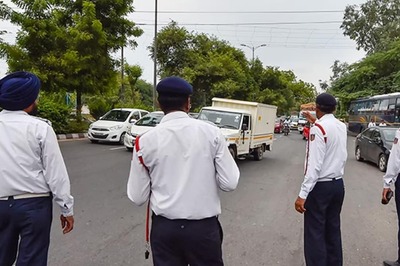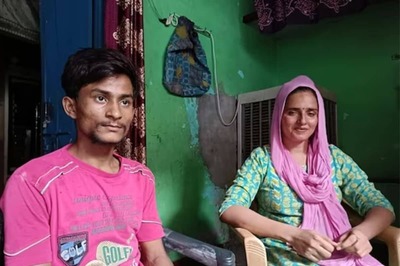
views
AK Mishra waits outside his son’s school to pick the Class 12 student up after an exam, like he does at the end of every academic year. This time, though, his anxiety may be equal to or even more than what the teenager would be experiencing inside the examination hall. It’s an important year academically, but the future is uncertain due to factors that are not in their control. That’s because there is a second wave of the Covid-19 pandemic just when they thought at least 2021 would be a bright year.
“The entire year (since the pandemic gripped India in March 2020), it has been online education. It has been very difficult. And now at least the exams are conducted offline since it’s the 12th board exams. I am worried about the rise in infection. I am also worried about his future. On the precaution side, students must be checked before they enter the exam hall,” said Mishra.
Two students waiting outside the school had opposing views on getting back to offline classes.
“I don’t feel safe at all because nobody follows Covid protocol. But there is no option for online exams. It has to be offline,” said Vinay Vishwanath.
Nehashree Ramesh did not agree. “The school is taking all the necessary precautions and I prefer offline classes because you can’t clear all doubts in an online class. Here you have the teacher face to face.”
However, what all of them agree on is how the past one year has changed the education system. Several students rejoiced about having a long vacation, but beyond a point, some saw the negative effects of it including a lack of socialisation. Those who prepared to study abroad had to put their plan away for a year. Or so they thought until the Covid wave hit again.
“I waited for about half the academic year to see if things would change and I can go abroad. I felt this isn’t going to end anytime soon, so four months ago I joined a college in Mangaluru. Probably I’ll go abroad for my master’s,” said Mohammed Rabbiyath Islam, a first-year degree student.
His college, St Aloysius, has had a new system in place since it reopened during the pandemic, to get the students used to offline classes again. The first, second and third year had offline classes for 15 days each and online classes for the rest of the days to ensure no two batches came to college at the same time.
A ‘class apart’
Successive closures and reopenings are likely to persist, as the virus continues to circulate globally, a report from the United Nations published in August last year pointed out. The report looked at education during Covid and beyond and noted that several countries were planning to implement a “hybrid” or blended model of education delivery. Other countries were significantly reducing class sizes or providing lessons outside, and in many countries, institutions required that almost all students and their teachers wore masks.
Countries in the UNESCO-UNICEF-World Bank Joint Survey reported that they plan a number of changes upon reopening: 23% of countries plan to recruit more teachers, 23% will increase class time, 64% will introduce remedial programmes, 32% will introduce accelerated learning programmes, and 62% plan to adjust the scope of curriculum content that will be covered.
Azaan Ibrahim, another student from Mangaluru, joined a college in Bengaluru last year. But for one year, he has attended only online classes. “I am not a fan of online classes but considering the present circumstances, it’s the best thing to do because many of my friends in other colleges have tested positive. Third-year students had offline classes but recently shifted to online due to the second wave. Now I think our exams will also be online,” said Ibrahim.
Around 300 students from The Manipal Institute of Technology in Udupi tested positive in the last fortnight contributing to more than 80% of the cases in the district. The institute has been sealed, declared a containment zone and classes shifted to online mode.
In spite of the risks of attending offline classes, many students and teachers prefer to meet.
“Online classes have been very difficult for me. I am a language teacher. So it is extremely important for me to have conversations with my students. During the online class, I seldom get any response from the students. Hardly three or four students respond or maybe only that many students are attending the class. It is always better to have students in class,” said a college teacher on condition of anonymity.
When learning fades
The situation only gets worse for school students. The pandemic induced lockdown and shutting down of schools led to the loss of basic ability in children in mathematics and language, a study by Azim Premji University found.
The study released in February this year found that 92% of children on average have lost at least one specific language ability and 82% of children on average have lost at least one specific mathematical ability from the previous year across all classes.
The specific language abilities include describing a picture or their experiences orally, reading familiar words, reading with comprehension, writing simple sentences based on a picture. At least 92% of children in class 2, 89% in class 3, 90% in class 4, 95% in class 5, and 93% in class 6 have lost at least one specific ability from the previous year.
The specific abilities in mathematics include identifying single and two-digit numbers, performing arithmetic operations, using basic arithmetic operations for solving problems, describing 2D/3D shapes, reading and drawing inferences from data, etc. 67% of children in class 2, 76% in class 3, 85% in class 4, 89% in class 5, and 89% in class 6 have lost at least one specific ability from the previous year, the study found.
Missing out
By mid-April 2020, 94% of learners worldwide were affected by the pandemic, representing 1.58 billion children and youth, from pre-primary to higher education, in 200 countries, according to the United Nations report. And the disruptions caused by Covid-19 to everyday life meant that as many as 40 million children worldwide have missed out on early childhood education in their critical pre-school year. They thus missed a stimulating and enriching environment, learning opportunities, social interaction and in some cases adequate nutrition. This is likely to compromise their longer-term healthy development, especially those children from poor and disadvantaged families.
“Government school kids are missing lunch. There’s no structure. Parents going to work, nothing to keep them occupied. Many of them have started working also. Parents pushing them to sell paper, do some hawking. All this is happening.
You need to have structured schooling. Even in upper middle class families, children are in online classes and parents are working; then who would monitor them? In families of migrant labourers, there’s one phone and three children. How do they manage?” asked Nina Nayak, former chairperson, Karnataka State Commission for the Protection of Child Rights.
“Of course, there is the risk of infection but at least at the community level, there need to be classes. A teacher can bring together kids of that area and teach under a tree or temple courtyard where there’s a lot of space as going to school will increase the risk of infection,” she added.
Not enough support
Sundari M works as a house help in Bengaluru. She’s a mother of four including two school-going children.
“My youngest child is in class 9. He used to go to a neighbour’s house along with three other children to attend the online classes since everybody doesn’t have a smartphone. But that led to fights between them and nobody understood anything that was being taught. Finally, I had to spend around Rs 3,500 for a second-hand phone from my meagre salary. I wish students would get back to school soon,” said Sundari.
The time has been especially hard for children with special needs.
“The online platform has no doubt made way to an ocean of possibilities, with its reach and creativity. But it is challenging to continue doing so with the lack of physical presence. Special educators are not able to connect with children, a need for support or a buddy at the child’s end is required (which again is a challenge). The attention is fragmented, the stimulus we present to make the child sit in one place and focus is under the threshold, and so many more. On the other hand, some are learning to be independent, learning to operate the system, and attending a class is a cognitive function. Which is a great sense of functional independence,” said Janavi Ananth, an expressive arts therapy practitioner.
“Special educators work with the intention of social skills and communication as a priority. I am afraid if we get used to online then we have to begin from scratch,” she said.
That is the fear echoed by many. When the pandemic is over, getting back to offline mode would be starting from square one for many. Taking off from where one left before the Covid times doesn’t seem too easy considering the pandemic is nowhere near ending.
Covid expert committees at both central and state levels have always given the least priority to reopening schools during the pandemic. This is primarily because of the challenges in ensuring Covid-appropriate norms among children.
In addition, the younger population while being immune to the virus can be easy carriers of the virus to older ones back home. Therefore, with the emergence of the second wave, the education system may well be prepared to witness a repeat of what was seen in the past one year until all or a majority of the population is vaccinated.
Read all the Latest News, Breaking News and Coronavirus News here




















Comments
0 comment